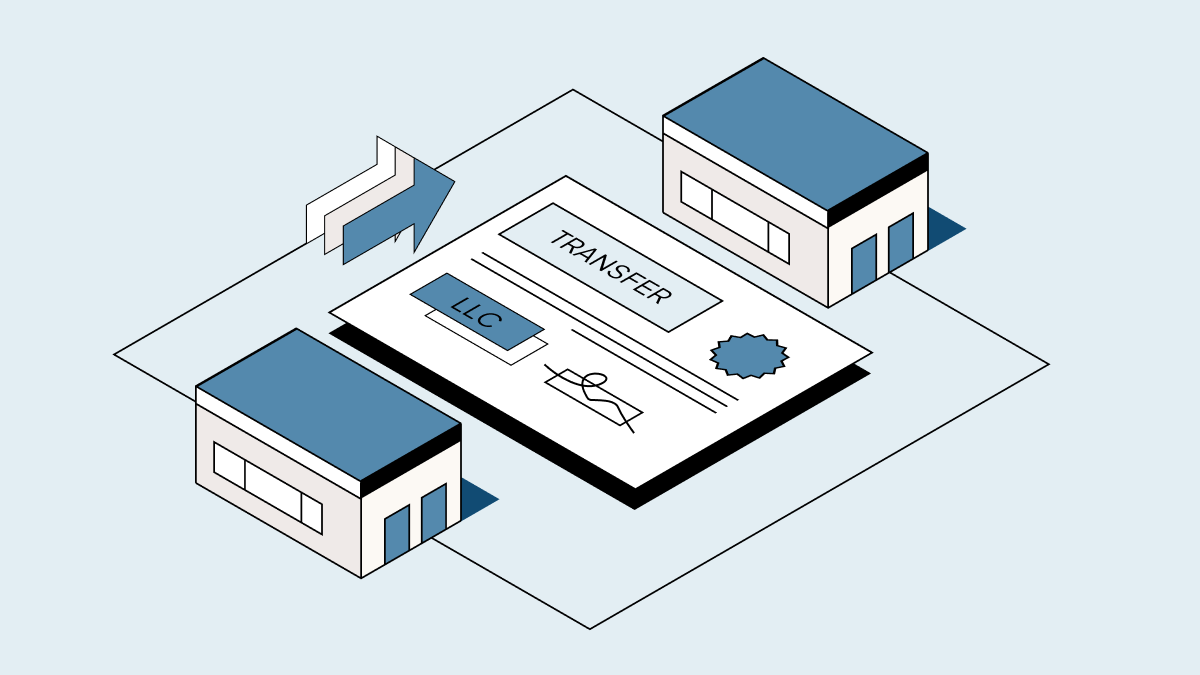A limited liability company (LLC) is a common business structure that allows the owners to keep their personal assets protected from losses or incidents that occur in the business.
When an owner of an LLC—also called an LLC member—transfers some or all of their ownership stake to a new person or entity, they must typically follow certain guidelines laid out in the company’s operating agreement.
Reasons for transferring ownership of an LLC
There are many reasons why LLC members may transfer some or all of their ownership in the LLC. Some of the more common scenarios include:
-
An LLC member wants to transfer some or all of their ownership to a trust for tax or estate-planning purposes
-
The LLC members want to sell some portion or all of the company to another company or outside investors
-
An LLC member is moving to another job or opportunity
-
An LLC member is retiring
-
The LLC is bringing on a new partner to expand the current ownership group
-
An LLC member dies, goes bankrupt, or in some other way is no longer able to fulfill their role
Types of limited liability company (LLC) transfers
Depending on the circumstances of the change in ownership, an LLC may undergo either a partial interest transfer or a full transfer of ownership.
Partial LLC transfer
A partial transfer is a change in LLC ownership that does not involve selling the entire business. If there are multiple LLC members, this could mean that one or more of those members are selling their interest in the company while other members are retaining theirs. If one LLC member owns 100% of the company, a partial transfer would mean the member is selling only a portion of their stake.
Full LLC transfer
In a full transfer, the LLC members give up full ownership of the company to someone else. If the owners of an LLC choose to sell the company, it will likely involve a full transfer.
How LLC ownership is transferred
Whether a company is conducting a partial or full transfer, the process for transferring LLC ownership might look quite similar. In both cases, many of the mechanisms for transferring ownership may already be laid out in the company’s existing documents and agreements.
The LLC operating agreement
An LLC operating agreement is in many ways a company’s founding document (similar to a corporation’s Articles of Incorporation). The operating agreement includes many details that may be important to consider when effecting an ownership transfer, including the company’s organizational structure, its tax status, and its owners. Most importantly for the purposes of transferring ownership, an operating agreement also typically includes a buy-sell agreement.
The buy-sell agreement
A buy-sell agreement is an agreement among the owners of an LLC that outlines how ownership of the business may be transferred if one or more existing members leave the business. The buy-sell agreement typically applies to all ownership change scenarios, ranging from a sale of the whole LLC to the death of one of the LLC members. A primary goal of the buy-sell agreement is to define the terms under which any transfer of ownership may occur in order to avoid future legal battles over ownership and control.
It’s common for a buy-sell agreement to stipulate that membership interests in the business can only be transferred to other LLC members. Thus, the buy-sell provisions might preclude an owner or owners from selling their membership interests in the LLC to an outside party.
If the buy-sell agreement does state that membership interests can only be transferred to other LLC members, in some cases the owners of the business might choose to take out life insurance policies on the lives of their fellow partners. In the event of a death, the remaining LLC members can use the proceeds of the policy to purchase the deceased owner’s membership interests from their estate.
What if you don’t have a buy-sell agreement?
If an LLC has an existing operating agreement that does not include a buy-sell agreement, it can typically add a buy-sell agreement later by approving it as an amendment to the original operating agreement. Alternatively—or if the LLC also does not have an operating agreement to amend—individual state laws related to LLCs may include regulations and guidance about transferring ownership.
Negotiating with a buyer
If an LLC member is permitted to sell membership interests to an outside buyer, or if the members agree to sell the entire business, the next step in pursuing a sale is to find potential acquirers and discuss the conditions of a sale. Many companies choose to work with a financial advisor, legal advisor, or other types of business advisors during the sale process. These advisors can help ensure the company is pursuing all possible paths and maximizing its value while also complying with all relevant rules and regulations.
Drafting a sale agreement
A sale agreement serves as a contract for a transfer of ownership. After negotiating terms with a buyer, the LLC—or more likely, its legal advisers—will create a document that outlines these terms in writing, including the sale price, the payment terms, details about what part or parts of the company are being sold, and any other relevant information.
Other considerations when transferring ownership
In addition to the above, an LLC and its legal and financial advisors might assess other potential variables when considering a transfer of ownership. These include:
-
If relevant, what is the price of any membership interests being sold in the transaction?
-
What is the impact of the transfer on the company’s valuation?
-
Do all necessary LLC owners agree to the conditions of the ownership transfer?
-
Do any relevant laws and regulations impact the ability to complete a transfer at the agreed terms?
-
Are the LLC owners or the company required to pay any taxes related to the transfer?
Post-transfer responsibilities
Once a sale agreement has been signed, a company must update its operating agreement, its capitalization table, and any other relevant documents to reflect the new ownership. LLC members must also notify various regulatory and financial institutions of any change in ownership, including their local secretary of state, the IRS (using Form 8822-B for a “Change of Address or Responsible Party — Business”), and any banks the LLC may work with.



